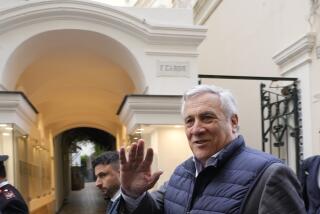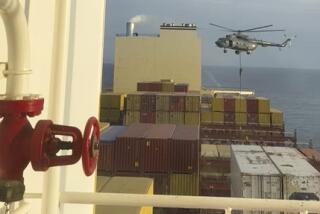EU imposes Iran oil embargo
Reporting from London and Washington — Europe slapped a boycott on Iranian oil Monday, signaling that the Islamic Republic’s second-largest market is likely to dry up as part of a U.S.-led sanctions campaign that has already inflicted serious damage on Iran’s economy and sharply increased tensions.
The value of Iran’s currency is falling dramatically, prices are rising and Iranians are stocking up on supplies in fear of worse to come. Iran, which receives an estimated 70% of its revenue from oil sales, has threatened to retaliate by choking off the flow of oil through the Strait of Hormuz at the southern end of the Persian Gulf.
The U.S. says it will not permit the strait to be closed, and over the weekend sent the aircraft carrier Abraham Lincoln through the waterway and into the gulf. There were no incidents.
European officials hope the new measures, in conjunction with tougher sanctions being imposed by Washington, will force Tehran back to the bargaining table over its nuclear enrichment program. Iran says the program is for peaceful purposes; the U.S. and its European allies suspect Tehran of trying to build nuclear weapons.
The 27-nation European Union’s new measure, which had been in the works for weeks, puts all new or proposed oil deals with Iran on ice. In a concession to countries in Southern Europe, many of which depend more heavily on Iranian imports and are struggling economically, existing contracts can run through the end of June, giving them time to find new suppliers.
Iran reacted defiantly. “The embargo will not affect Iran, and considering the economic turmoil in Europe, it will de facto hurt the EU members more than Iran,” Alaeddin Boroujerdi, head of parliament’s foreign policy committee, told the semiofficial Iranian Students News Agency.
Foreign Ministry spokesman Ramin Mehmanparast said the boycott would not stop Iran’s nuclear program. “Imposing economic sanctions is illogical and unfair, but will not stop our nation from obtaining its rights,” he said.
The EU also froze assets held in Europe by Iran’s central bank. It proscribed trade in gold and other precious metals and diamonds between the EU and Iranian public bodies.
British Foreign Secretary William Hague called the package “an unprecedented set of sanctions” that ought to encourage similar action by other nations.
European officials emphasized their desire to see Tehran reenter talks on its nuclear program. “The pressure of sanctions is designed to try and make sure that Iran takes seriously our request to come to the table and meet,” said Catherine Ashton, the EU’s top diplomat.
In the past, Europe often has resisted U.S. efforts to build pressure on Iran.
“If you had told me a year or two ago that the Europeans would do something like this, I would have said you were crazy,” said Mark Dubowitz, executive director of the Foundation for Defense of Democracies, a research group in Washington that favors strong sanctions.
European governments have embraced tougher measures now partly out of frustration over Iran’s unwillingness to negotiate, but also because they fear that Israel, the United States or others could turn to military action to stop Iran’s nuclear program if economic pressure fails.
Israeli Prime Minister Benjamin Netanyahu called the EU embargo a step in the right direction. “Very strong and quick pressure on Iran is necessary,” he said.
Russia denounced the EU’s move as a serious error. “Under such pressure, Iran will make no concessions and no correction of its policy,” the Foreign Ministry said.
Among the strongest champions of an oil embargo were EU powerhouses Britain, France and Germany, none of them major buyers of Iranian crude.
But Greece, already teetering on the edge of bankruptcy, has been especially worried about replacing Iranian oil with new, more expensive supplies. A Spanish official said this month that a boycott would cause “huge damage” to his country’s economy. In a nod to such concerns, the EU agreed that it would review the effects of the embargo by May 1.
The effect will be amplified by a new round of U.S. sanctions, which, if fully implemented, will prevent companies that do business with Iran’s central bank from dealing with American companies.
The embargo is part of a Western effort to persuade countries that consume Iranian oil to find other sources, sharply reducing Iran’s oil income.
Western governments hope that if the Europeans, Japan and South Korea all sharply cut back on their purchases, other buyers could demand discounts from Iran, reducing revenue by 20% or more.
Although Japan and South Korea have given no definitive word, U.S. officials and private analysts say they expect those governments to substantially reduce their purchases, provided Saudi Arabia and other suppliers step in.
China says publicly that it will not yield to pressure to give up Iranian oil, but it has reportedly cut back on purchases for January and February and is pushing for discounts.
Chu reported from London and Richter from Washington. Times staff writers Edmund Sanders in Jerusalem and Sergei L. Loiko in Yaroslavl, Russia, and special correspondent Ramin Mostaghim in Tehran contributed to this report.
More to Read
Sign up for Essential California
The most important California stories and recommendations in your inbox every morning.
You may occasionally receive promotional content from the Los Angeles Times.












